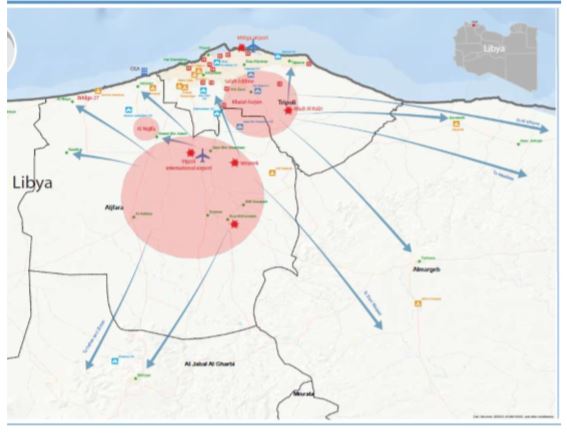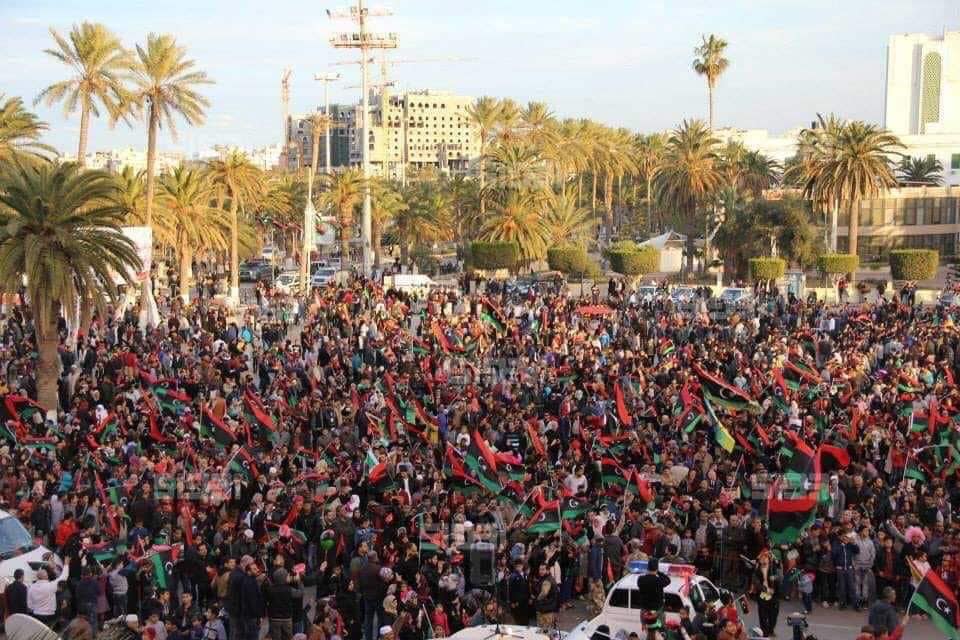By Sami Zaptia.

London, 12 April 2019:
Protection concerns for civilians remain paramount with reports of indiscriminate shelling on densely populated areas in Ain Zara and Swani in the southern outskirts of Tripoli yesterday, the UN’s Office for the Coordination of Humanitarian Affairs (OCHA) said in its latest report released yesterday.
As the fluid fighting continues with shifting frontlines in a cat-and-mouse fashion, frontlines in the main have remained constant as neither side has been able to make any deep incursions. The report confirms fighting in the Tripoli Airport, Qaser Ben Ghashir, Swani, Ain Zara and Wadi Rabea areas.
The OCHA report revealed that the Health Sector has verified reports of seven civilian fatalities and ten civilian injuries since the onset of fighting in and around Tripoli. This number includes the deaths of three medical staff and the injury of one health worker.
Additionally, five attacks on ambulances have been verified, including reports of two ambulances belonging to field hospitals which were hit by the shrapnel. Furthermore, the electricity supply to some fourteen areas south of Tripoli, including Al Furjan and Wadi Al-Rabea, has been affected after some poles and electricity lines were damaged in the fighting.
The security of civilians stuck in conflict-affected areas, particularly in the outskirts of Tripoli, remains precarious. Local teams responsible for the evacuation of civilians continue to receive requests for the relocation of families to comparatively safer areas. At the time of writing this report, some 761 requests for the relocation of around 3,800 individuals had been received by evacuation teams.
the report says that to date, its teams were only able to respond to some 111 requests, 43 of whom were evacuations from Swani which saw a dramatic upsurge in violence on 11 April.
Evacuation teams continue to report access restrictions due to armed conflict, and indiscriminate or even direct targeting of the first response teams. On 11 April, one ambulance in Ain Zara came under gunfire on its way to evacuate an injured person, and the planned evacuation subsequently had to be aborted.
The Humanitarian Coordinator has reminded all parties to the conflict that under international humanitarian law, medical facilities, medical personnel and medical transport must be respected and protected at all times, and that attacks targeting them are prohibited.
The United Nations further reiterates its call for a temporary humanitarian truce to allow for the provision of emergency services and the voluntary passage of civilians, including those wounded, from areas of conflict.
Since the onset of armed conflict, the report says, at least 9,500 individuals were forced to leave their homes. This includes the displacement movement of some 3,500 additional individuals in the last 24 hours. While displacement numbers had been significantly but steadily increasing over the past couple of days at a rate of 33 per cent, today’s displacement numbers represent a 60 per cent increase in comparison to the previous day.
Key IDP reception areas include Tripoli, Tajoura and Ain Zara, accounting for just under half of the IDP influx, while smaller numbers of IDPs have also displaced to Al Zahra, Al Maya, Zintan, Tajoura, Swani, Al Khums, Garabolli, Bani Waleed, and other areas.
Families who displaced to areas that are now gradually moving in the vicinity of frontlines are at risk of onward displacement, and on 11 April, some 167 individuals already had to evacuate the Al-Asma school in Ain Zara, and were relocated to another school that is currently serving as a collective shelter in a comparatively safer area.
Many migrants and refugees in detention centres in and around Tripoli are also at particular risk to become affected by armed conflict. Through the provision of transportation, IOM and UNHCR provided an opportunity for refugees and migrants in the Qasir Ben Ghashir detention centre to relocate to the Zintan detention centre, which is located in a safer area.
The report says that UN staff were not present given ongoing clashes in the area. Despite counselling on safety considerations, the 728 individuals, of whom 320 persons of concern are registered with UNHCR, currently residing in the detention centre opted to remain in the facility. Previously, on 9 April, UNHCR successfully relocated more than 150 refugees from the Ain Zara detention centre in southern Tripoli to UNHCR’s Gathering and Departure Facility.








